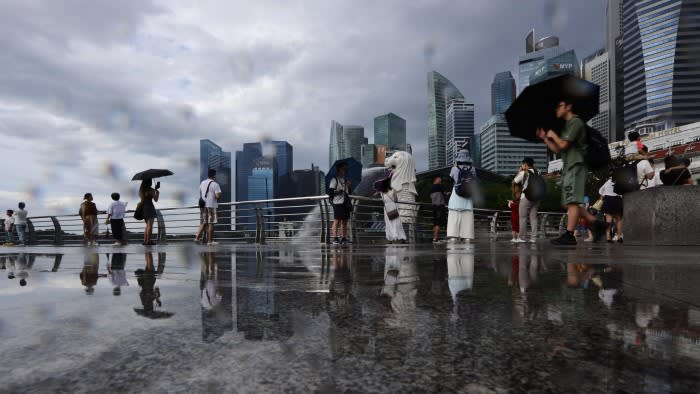Singapore’s National Day rally is traditionally an opportunity for the prime minister to outline his domestic policy plans, but Prime Minister Lawrence Wong struck an uncharacteristically ominous tone in his first speech of the year.
“We have seen what happens in other countries when the broad middle class is left behind,” said Wong, who became Singapore’s fourth prime minister in May and only the second from outside the country’s founding family, the Lee family. “The middle path cannot be maintained. Society becomes divided and begins to disintegrate.”
“Don’t think something like this won’t happen here,” he added. “It can and will happen unless we take decisive action to prevent it.”
Wong’s warning this month reflected the government’s concern about the political impact of rising living costs ahead of elections due in November 2025 that will usher in a post-Lee political era.
Analysts say pressures from rising house prices are growing disillusionment among Singapore’s middle class, threatening the fragile consensus that has underpinned decades of growth and stability in the city-state.
“The top class isn’t that big here, but the middle class is huge,” said Gillian Koh, a researcher at the National University of Singapore’s Policy Research Institute. [the government]It is in the nation’s interest to have a broad, strong, healthy and stable middle class.”
The economy dominates public opinion: In the latest quarterly survey conducted in June by local pollster Black Box Research, 52% of respondents said the cost of living was the most important issue, followed by salaries and wages at 16%. Immigration, often a political hotbed of contention in this city-state of 6 million, received just 5%.
Singapore is generally hailed as an economic success story — according to the IMF, it has the fifth-largest GDP in the world, behind Luxembourg and Switzerland — and despite its free-market reputation, government statistics show that more than 80 percent of Singapore residents live in public housing, and 90 percent of those own their own homes.
But not everyone is keeping up with growing prosperity. “No one is dying of hunger in Singapore, but there is food insecurity,” says Robin Lee, chief executive of Food from the Heart, a charity that provided meals to about 60,000 low-income people in 2023. “It’s shocking to some people that in a country like Singapore we still have to do this.”
“The cost of living is definitely on my mind” ahead of the election, he said. “The cost of living is really high, and the wages are high, but it’s relative.”
Singapore’s ruling People’s Action Party, which has ruled the tightly controlled country continuously since 1959, is grappling with these economic challenges and facing declining voter turnout in general elections, including in 2020 when the opposition made significant gains.
The PAP’s dominance is such that even the opposition Workers’ Party balks at any suggestion it could take power. Party leader Pritam Singh demanded a correction to a Straits Times article in April that suggested the party was hoping to form government, clarifying that its medium-term goal is simply to “play our part in keeping at least a third of Parliament out of the PAP’s hands”.
“The WP wants an evolution, not a revolution, of the political system,” he said.
With the People’s Action Party almost certain to win the polls and Wong to remain prime minister, he faces the challenge of winning the support of voters disappointed after the transition of power from the Lee clan.
Wong was appointed by the party after Lee Hsien Loong, the son of founding leader Lee Kuan Yew, who has led the country since 2004, stepped down as prime minister in May. Following in his father’s footsteps, Lee Hsien Loong remains in government as a senior minister and secretary-general of the People’s Action Party.
Mr Wong, who served as principal secretary to Prime Minister Lee Hsien Loong before holding a number of ministerial positions, has often cited his non-elite education and emphasised his common man credentials in an attempt to win support from ordinary Singaporeans.
The rally speech included a series of grants and populist pledges, including study and retraining support for the unemployed, policies to keep public housing affordable, improved shared parental leave and an upskilling allowance to cover 24 months of full-time training for Singaporeans aged 40 and above.
The 2024 budget, released in February, also includes a S$1.9 billion (US$1.5 billion) expansion of the government’s cost-of-living adjustment scheme through vouchers, cash transfers and discounts.
His government has also promised to set up an Islamic studies institute to support Muslim leaders and another to improve standards of spoken Mandarin — initiatives that reflect a concern for maintaining harmony in Singapore, a multiracial nation where 15 percent are Malay, 7.6 percent Indian and 75 percent Chinese.
Highly import-dependent Singapore has limited room to cut costs, but recent economic data paint a brighter picture: Core annual inflation fell to 2.5% in July, the lowest in more than two years, while non-oil exports rose 15.7% from a year earlier, the first annual increase since January.
The Monetary Authority of Singapore, which Wong chaired until May, had kept the Singapore dollar near a 10-year high against the U.S. dollar to keep the cost of imported goods down.
For Wong, the focus on affordability seems more urgent than balancing tensions over foreign workers or geopolitical friction between the U.S. and China. “This is something the government needs to approach very carefully,” said Robin Lee of Food from the Heart.


